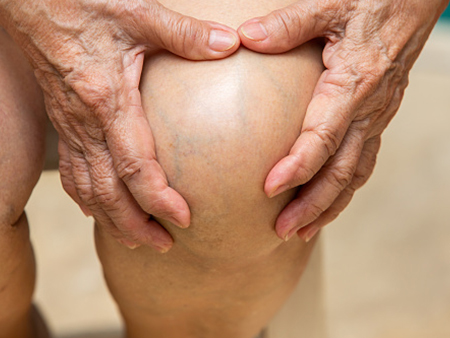 A change in diet can reduce the intense pain caused by knee osteoarthritis, the most prominent form of arthritis, according to research findings published this week in the journal Pain Medicine.
A change in diet can reduce the intense pain caused by knee osteoarthritis, the most prominent form of arthritis, according to research findings published this week in the journal Pain Medicine.
A study conducted at the University of Alabama at Birmingham shows a low-carbohydrate diet was more effective in reducing pain intensity than a low-fat diet in adults ages 65-75 suffering from osteoarthritis. Researchers in the UAB College of Arts and Sciences also found the low-carb diet specifically increased the quality of life and decreased serum levels of the adipokine leptin and a marker of oxidative stress.
“Our work shows people can reduce their pain with a change in diet,” said Robert Sorge, Ph.D., lead author of the study and director of the PAIN Collective in the UAB Department of Psychology. “Many medications for pain cause a host of side effects that may require other drugs to reduce. The beneficial side effects of our diet may be things such as reduced risk for heart disease, diabetes and weight loss — something many drugs cannot claim.”
Because there is no curative treatment for knee osteoarthritis outside of a knee replacement, persistent pain is commonly treated with opioids, acetaminophen and nonsteroidal anti-inflammatory drugs — all of which have unpleasant side effects if used for an extensive period.
Over-the-counter anti-inflammatory medication side effects can include high blood pressure, liver or kidney problems, stomach ulcers and pain, heartburn, allergic reactions such as rashes, wheezing and throat swelling, and a tendency to bleed more, especially when taking aspirin.
Time-restricted feeding study shows promise in helping people shed body fat
Opioids may work well for short-term severe pain; but they have limited usefulness over the long term and, in some cases, perform no better than over-the-counter drugs, Sorge says.
The advantage of a change in diet is that it can be done without long-term anti-inflammatory use or prescription medications, and it can be tailored to taste and preferences.
“Diet is a great way to reduce the use of pain relievers and to improve general health,” Sorge said. “Diet will never ‘cure’ pain, but our work suggests it can reduce it to the point where it does not interfere with daily activities to a high degree.”
Sorge also adds that weight loss alone did not reduce pain in study participants.
“The quality of the diet and types of foods consumed have more to do with pain reduction than weight loss, according to our findings,” Sorge said.
Fad diets or lifestyle changes — where do three popular weight-reduction plans fit in?
Low-carb foodsThe human body needs carbohydrates, protein and fat to work properly. The body can break down carbohydrates immediately upon consumption or later to give the body energy. Carbs not used immediately are stored in the muscles and liver to use later, but if the body does not use the stored cars, it then converts them to fat. Popular low-carb food options include:
|
Diets such as the Mediterranean diet (a partial low-carbohydrate diet) have been shown to reduce inflammation in arthritis patients and self-reported pain in osteoarthritis and rheumatoid arthritis. This previous work supported Sorge’s hypothesis that, by lowering the intake of refined carbohydrates, oxidative stress would decrease and functional pain would be improved.
However, diet intervention studies to date have focused exclusively on self-reported pain, and not assessment of functional pain, which Sorge believes may be a better indicator of efficacy.
Study mechanics
The UAB randomized controlled pilot study of 21 adults (nine males, 12 females) tested the efficacy of low-carb and low-fat dietary interventions in adults ages 65-75 with knee osteoarthritis, the most prominent form of arthritis. This osteoarthritis affects approximately 15 percent of the United States population and, because of its affinity for the lower, weight-bearing joints, has become one of the leading causes of disability in the lower extremities in an ever-aging population.
Study particpants were asked to follow one of the two dietary interventions or continue to eat as normal for a period of 12 weeks. Functional pain, self-reported pain, quality of life and depression were assessed every three weeks. Serum from before and after the diet intervention was analyzed for oxidative stress
Low-carb diet recommended for diabetics
The low-carb diet reduced pain intensity and unpleasantness in some functional pain tasks, as well as self-reported pain, especially when compared to the low-fat diet and usual diet participants.
The low-carb diet also significantly reduced oxidative stress and the adipokine leptin compared with the other diets. That finding was particularly interesting since reduction in oxidative stress was related to reduced functional pain, or pain associated with engaging in normal, everyday things.
To test functional pain, researchers asked participants with knee pain to stand from a sitting position a number of times, walk a set distance, and then tested their knees for pain response by repeated stimulation.
“The tests were meant to replicate the kind of pain that people experience on a day-to-day basis that may limit their functioning,” Sorge said.
The study was spurred by Sorge’s previous research in animal models that showed a poor-quality diet had negative effects on health, the immune system and recovery from injury. His previous research also showed a good diet could reverse many of these changes.
Ketogenic diet reduces body fat in women with ovarian or endometrial cancer.